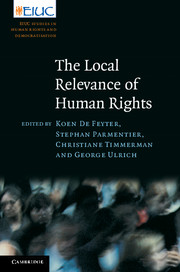Book contents
- Frontmatter
- Contents
- Contributors
- Series editors' preface
- Preface
- Abbreviations
- 1 Introduction: reconsidering human rights from below
- 2 Sites of rights resistance
- 3 Freedom from want revisited from a local perspective: evolution and challenges ahead
- 4 Relevance of human rights in the glocal space of politics: how to enlarge democratic practice beyond state boundaries and build up a peaceful world order
- 5 The local relevance of human rights: a methodological approach
- 6 Ensuring compliance with decisions by international and regional human rights bodies: the case of the European Committee for the Prevention of Torture
- 7 Building rights-based health movements: lessons from the Peruvian experience
- 8 Defining human rights when economic interests are high: the case of the western Shoshone
- 9 Struggling to localise human rights: the experience of indigenous peoples in Chile
- 10 Enforcing environmental rights under Nigeria's 1999 Constitution: the localisation of human rights in the Niger Delta region
- 11 Conflict resolution through cultural rights and cultural wrongs: the Kosovo example
- 12 Epilogue: widening the perspective on the local relevance of human rights
- Index
- References
3 - Freedom from want revisited from a local perspective: evolution and challenges ahead
Published online by Cambridge University Press: 07 October 2011
- Frontmatter
- Contents
- Contributors
- Series editors' preface
- Preface
- Abbreviations
- 1 Introduction: reconsidering human rights from below
- 2 Sites of rights resistance
- 3 Freedom from want revisited from a local perspective: evolution and challenges ahead
- 4 Relevance of human rights in the glocal space of politics: how to enlarge democratic practice beyond state boundaries and build up a peaceful world order
- 5 The local relevance of human rights: a methodological approach
- 6 Ensuring compliance with decisions by international and regional human rights bodies: the case of the European Committee for the Prevention of Torture
- 7 Building rights-based health movements: lessons from the Peruvian experience
- 8 Defining human rights when economic interests are high: the case of the western Shoshone
- 9 Struggling to localise human rights: the experience of indigenous peoples in Chile
- 10 Enforcing environmental rights under Nigeria's 1999 Constitution: the localisation of human rights in the Niger Delta region
- 11 Conflict resolution through cultural rights and cultural wrongs: the Kosovo example
- 12 Epilogue: widening the perspective on the local relevance of human rights
- Index
- References
Summary
I would like to start my contribution by paying tribute to the Universal Declaration of Human Rights (UDHR) on its sixtieth anniversary as the first universal instrument to incorporate economic, social and cultural rights (ESC rights) as an essential component of an integral and comprehensive notion of human rights. As stated in the very preamble of the UDHR, one of the goals of the peoples of the United Nations is ‘to promote social progress and better standards of life in larger freedom’, thus explicitly linking fundamental freedoms with the promotion of socio-economic rights.
It cannot be said that in 1948 the UDHR responded to a localising paradigm, since its process of adoption was fully monopolised by nation states, particularly those that dominated the international scene after the Second World War, and did not take into consideration local realities, local needs and local ways of framing the protection of human dignity. The elaboration of the UDHR followed what can be considered as a top-down approach rather than a bottom-up approach. Basically, the seminal document of the human rights movement in the twentieth century sought to offer ‘universal legitimacy to a doctrine that is fundamentally Eurocentric [. . .] Non-western philosophies and traditions were either unrepresented or marginalised, (and) most Asian and African societies were European colonies and not participants in the making of human rights law’. Along the same lines, David Kennedy has defined the origins of the human rights movement as ‘post-enlightenment, rationalist, secular, western, modern, and capitalist’.
- Type
- Chapter
- Information
- The Local Relevance of Human Rights , pp. 40 - 81Publisher: Cambridge University PressPrint publication year: 2011

